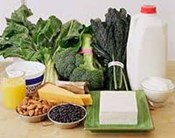Certain foods can affect your bones. Learning about these foods can help you make healthier food choices every day. Here are some examples of foods that are rich in calcium, vitamin D and other nutrients that appear to be important for bone health and overall health.
Good-for-Your-Bones Foods
|
Food |
Nutrient |
|
Dairy products such as low-fat and non-fat milk, yogurt and cheese |
Calcium. Some dairy products are fortified with Vitamin D. |
|
Fish |
|
|
Canned sardines and salmon (with bones) |
Calcium |
|
Fatty varieties such as salmon, mackerel, tuna and sardines |
Vitamin D |
|
Fruits and vegetables |
|
|
Collard greens, turnip greens, kale, okra, Chinese cabbage, dandelion greens, mustard greens and broccoli. |
Calcium |
|
Spinach, beet greens, okra, tomato products, artichokes, plantains, potatoes, sweet potatoes, collard greens and raisins. |
Magnesium |
|
Tomato products, raisins, potatoes, spinach, sweet potatoes, papaya, oranges, orange juice, bananas, plantains and prunes. |
Potassium |
|
Red peppers, green peppers, oranges, grapefruits, broccoli, strawberries, brussels sprouts, papaya and pineapples. |
Vitamin C |
|
Dark green leafy vegetables such as kale, collard greens, spinach, mustard greens, turnip greens and brussel sprouts. |
Vitamin K |
|
Fortified Foods |
|
|
Calcium and vitamin D are sometimes added to certain brands of juices, breakfast foods, soy milk, rice milk, cereals, snacks and breads. |
Calcium, Vitamin D |
If you eat a well-balanced diet, you should be getting enough of these nutrients. If not, you may need to take multivitamins or supplements. Consult your health care professional about taking supplements.
More Tips for Eating for Good Bone Health
Beans (legumes). While beans contain calcium, beans contain magnesium, fiber and other nutrients, they are also high in substances called phytates. Phytates interfere with your body’s ability to absorb the calcium that is contained in beans. You can reduce the phytate level by soaking beans in water for several hours and then cooking them in fresh water.
Meat and other high protein foods. It’s important to get enough, but not too much protein for bone health and overall health. Many older adults do not get enough protein in their diets and this may be harmful to bones. However, special high protein diets that contain multiple servings of meat and protein with each meal can also cause the body to lose calcium. You can make up for this loss by getting enough calcium for your body’s needs. For example dairy products, although high in protein, also contain calcium that is important for healthy bones.
Salty foods. Eating foods that have a lot of salt (sodium) causes your body to lose calcium and can lead to bone loss. Try to limit the amount of processed foods, canned foods and salt added to the foods you eat each day. To learn if a food is high in sodium, look at the Nutrition Facts label. if it lists 20% or more for the % Daily Value, it is high in sodium. Aim to get 2,400 mg or less of sodium per day.
Spinach and other foods with oxalates. Your body doesn’t absorb calcium well from foods that are high in oxalates (oxalic acid) such as spinach. Other foods with oxalates are rhubarb, beet greens and certain beans. These foods contain other healthy nutrients, but they just shouldn’t be counted as sources of calcium.
Wheat bran. Like beans, wheat bran contains high levels of phytates which can prevent your body from absorbing calcium. However, unlike beans 100% wheat bran is the only food that appears to reduce the absorption of calcium in other foods eaten at the same time. For example, when you have milk and 100% wheat bran cereal together, your body can absorb some, but not all, of the calcium from the milk. The wheat bran in other foods like breads is much less concentrated and not likely to have a noticeable impact on calcium absorption. If you take calcium supplements, you may want to take them two or more hours before or after eating 100% wheat bran.
Alcohol and Caffeine
Alcohol. Drinking heavily can lead to bone loss. Limit alcohol to no more than 2 drinks per day.
Caffeine. Coffee, tea and soft drinks (sodas) contain caffeine, which may decrease calcium absorption and contribute to bone loss. Choose these drinks in moderation.
Coffee/tea. Drinking more than three cups of coffee every day may interfere with calcium absorption and cause bone loss.
Soft drinks. Some studies suggest that colas, but not other soft drinks, are associated with bone loss. While more research will help us to better understand the link between soft drinks and bone health, here is what we know:
The carbonation in soft drinks does not cause any harm to bone. The caffeine and phosphorous commonly found in colas may contribute to bone loss. Like calcium, phosphorous is a part of the bones. It is listed as an ingredient in colas, some other soft drinks and processed foods as “phosphate” or “phosphoric acid.”
Some experts say that Americans get too much phosphorous, while others believe that it is not a problem as long as people get enough calcium. The harm to bone may actually be caused when people choose soft drinks over milk and calcium-fortified beverages.
Luckily you can help make up for any calcium lost from these beverages by getting enough calcium to meet your body’s needs.
Source: National Osteoporosis Foundation, http://www.nof.org/articles/237







